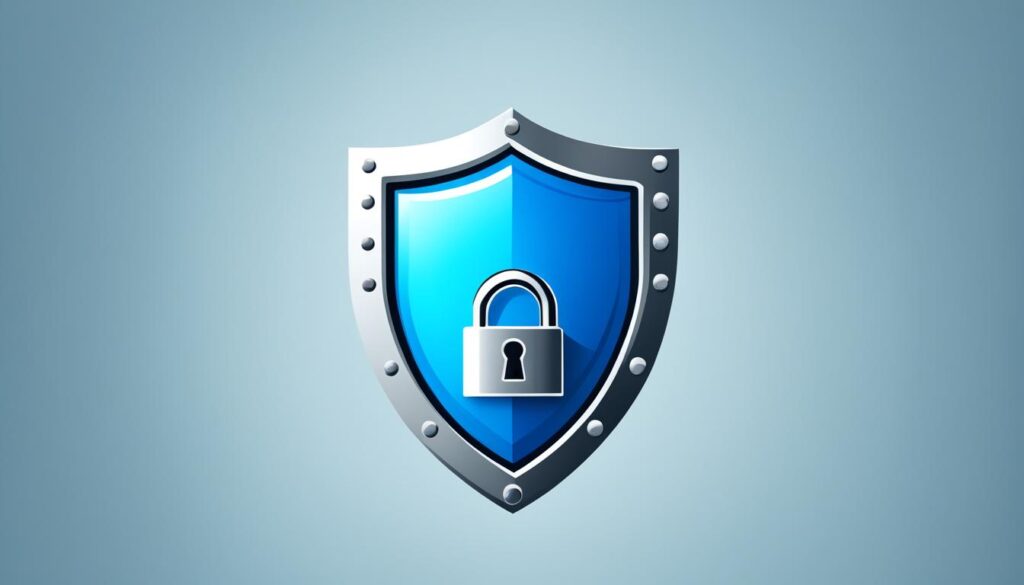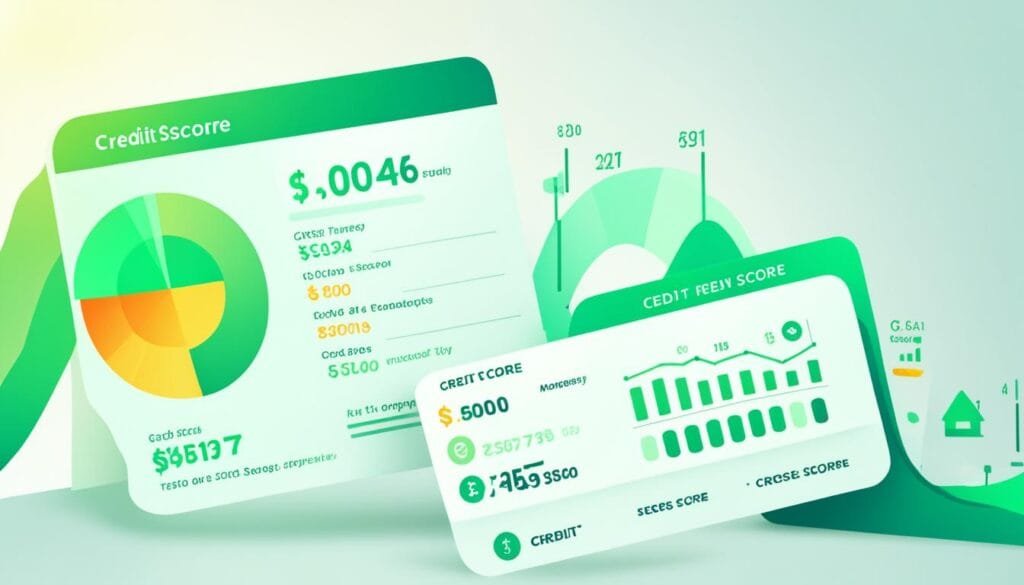Credit report monitoring is an essential step in protecting your financial well-being. By keeping a close eye on your credit history, you can be notified of any changes made to your credit reports, allowing you to take immediate action against potential misuse of your personal information.
Using credit monitoring services, you can track the credit history displayed on your credit report and receive alerts via email, text, or phone whenever there are any changes. This early warning system is invaluable in detecting fraudulent activities and preventing identity theft.
While credit monitoring provides a valuable layer of protection, it’s important to note that it is not a comprehensive approach to preventing identity theft or unauthorized transactions. It has its limitations, and understanding these limitations is crucial in choosing the right service for your needs.
Key Takeaways:
- Credit report monitoring is a vital tool in safeguarding your credit and personal information.
- Monitoring services keep track of your credit history and notify you of any changes to your credit reports.
- While credit monitoring is useful for spotting potential signs of fraud, it cannot guarantee fraud prevention.
- Additional steps such as credit freezes, monitoring your credit reports, and protecting your personal information are crucial for comprehensive fraud protection.
- When choosing a credit monitoring service, consider factors such as services offered, cancellation policies, and consumer rights.
What Credit Monitoring Does
Credit monitoring services offer comprehensive tracking of various activities related to your credit history and credit report. These services utilize advanced technology to monitor your credit file, providing you with real-time updates and alerts about any changes or suspicious activities. By regularly monitoring your credit, you can stay informed and take timely action when necessary.
Here are some key areas that credit monitoring services track:
Hard Inquiries
Credit monitoring keeps an eye on any hard inquiries made on your credit report. Hard inquiries typically occur when you apply for new credit, such as a loan or credit card. By monitoring these inquiries, you can quickly identify any unauthorized or fraudulent credit applications made in your name.
New Accounts
Credit monitoring services notify you of any new accounts opened under your name. This includes credit cards, loans, or any other forms of credit. Monitoring these new accounts allows you to spot potential identity theft or unauthorized activities before they cause significant damage to your credit profile.
Balances and Payments
Monitoring services also track the balances and payment activities associated with your credit accounts. This helps you keep tabs on your credit utilization and ensures that all payments are being reported accurately. It also enables you to detect any unusual or unauthorized activities involving your credit balances or missed payments.
Address and Name Changes
Credit monitoring services are designed to detect any changes to your personal information, such as address or name changes. These changes could be indicators of identity theft or fraudulent activities. By promptly receiving alerts about such changes, you can take the necessary steps to verify their legitimacy and mitigate any potential risks to your credit.
Public Records
Certain public records, such as bankruptcies, tax liens, or civil judgments, can have a significant impact on your creditworthiness. Credit monitoring services keep an eye on these public records and notify you of any additions or deletions. This allows you to stay informed about any negative information that may be affecting your credit report.
Personal Information on the Dark Web
The dark web is notorious for illegal activities, including the sale and trade of personal information. Credit monitoring services employ sophisticated technology to scan the dark web for any instances of your personal information being compromised. By monitoring the dark web, you can stay ahead of potential identity theft and take preventive measures to safeguard your personal and financial data.
By utilizing credit monitoring services, you can save time and effort by relying on automated systems to track changes and potential risks to your credit file. This provides you with greater peace of mind and ensures that you stay informed about the status of your credit profile.
| Benefits of Credit Monitoring | Limitations of Credit Monitoring |
|---|---|
|
|
What Credit Monitoring Doesn’t Do
Credit monitoring is a valuable tool for identifying potential signs of fraud and keeping a close eye on your credit activity. However, it’s essential to understand what credit monitoring cannot do.
Credit monitoring services cannot guarantee fraud prevention. While they can alert you to suspicious activity, they cannot stop someone from applying for credit in your name. Credit monitoring also cannot protect your information from data breaches or prevent credit card fraud or unauthorized transactions. It is not designed to warn you about tax return fraud or stop phishing emails.
Additionally, credit monitoring services cannot report fraud to authorities or fix credit report errors on their own. While they can detect discrepancies, it’s up to you to take action and report the fraudulent activity. Lastly, credit monitoring services cannot freeze your credit. This additional step is crucial for preventing unauthorized access to your credit file.
It’s important to recognize the limitations of credit monitoring and take additional steps to protect yourself from fraud. Combine credit monitoring with other security measures such as regularly checking your credit reports, safeguarding your personal information, and understanding your rights and liability for unauthorized charges. By adopting a comprehensive approach to fraud prevention, you can better safeguard your financial well-being.
“Credit monitoring is a valuable tool for identifying potential signs of fraud, but it’s important to understand its limitations and take additional steps to protect yourself.”
Paid vs. Free Credit Monitoring
When it comes to credit monitoring services, consumers have the option to choose between paid and free options. Following high-profile data breaches, many Americans qualified for free credit monitoring services. However, if you are not eligible for free monitoring, you can consider purchasing a credit monitoring service from various providers. It is important to note that just because a service requires payment, it does not necessarily mean it offers better protection. Conducting a thorough comparison of the services offered by different credit monitoring companies is crucial in determining which option best suits your needs.
While free credit monitoring options may provide basic monitoring services, paid options often offer more comprehensive features. These may include real-time credit monitoring, identity theft protection, three-bureau credit monitoring, and additional security measures. By investing in a paid credit monitoring service, you may gain access to advanced tools and resources that can enhance your overall protection against potential threats.
It is important to review the services offered by different credit monitoring providers to determine which one meets your needs.
Before making any decisions, take the time to assess your requirements and compare the services, benefits, and costs associated with both paid and free credit monitoring options. Consider factors such as the scope of monitoring, frequency of alerts, identity theft protection features, customer support, and the company’s reputation in the industry.
Remember, credit monitoring is just one aspect of safeguarding your financial well-being. It is advisable to complement credit monitoring with other proactive measures, such as regularly checking your credit reports, implementing credit freezes, protecting your personal information, and being cautious of potential scams. By taking a multi-layered approach, you can strengthen your defense against identity theft and unauthorized transactions.
Comparison of Paid and Free Credit Monitoring Services
| Features | Paid Credit Monitoring | Free Credit Monitoring |
|---|---|---|
| Real-time credit monitoring | Yes | Limited |
| Identity theft protection | Comprehensive | Basic |
| Three-bureau credit monitoring | Available | Limited |
| Advanced security measures | Yes | No |
| Frequency of alerts | Immediate | Delayed |
| Customer support | Dedicated assistance | Limited assistance |
As seen in the comparison table above, paid credit monitoring services generally offer a wider range of features and more robust protection. While free credit monitoring can serve as a starting point, it may not provide the same level of comprehensive monitoring and support.
Ultimately, finding the right credit monitoring service for your needs involves carefully weighing the options, considering the cost-benefit ratio, and selecting one that aligns with your specific requirements. Whether you opt for a paid or free credit monitoring service, taking a proactive approach towards protecting your credit and personal information is essential for maintaining your financial security.
How to Protect Yourself from Fraud
Credit monitoring alone is not enough to fully protect yourself from fraud. It’s important to take additional steps to safeguard your finances. By following these recommendations, you can help minimize the risk of fraud and protect your personal information.
1. Freeze Your Credit Reports
Consider placing a credit freeze on your credit reports. This prevents potential creditors from accessing your credit information, making it more difficult for fraudsters to open new accounts in your name. It’s a proactive measure that provides an extra layer of security.
2. Regularly Monitor Your Credit Reports
Stay vigilant by checking your credit reports regularly. Look for any unauthorized activity or errors that could be a sign of fraudulent activity. Monitoring your credit reports allows you to detect and address issues promptly.
3. Be Wary of Scams and Phishing Attempts
Be cautious when sharing personal information online, and be wary of unsolicited calls or emails requesting sensitive data. Scammers often impersonate trustworthy institutions to deceive individuals. Avoid clicking on suspicious links or providing personal information unless you are confident in the source.
4. Secure Your Personal Information
Keep your personal information safe by employing strong, unique passwords for your accounts and utilizing two-factor authentication whenever possible. Avoid sharing personal information on unsecured websites or over unencrypted connections.
5. Understand Your Liability for Unauthorized Charges
Be aware of your rights and liabilities when it comes to unauthorized charges. Familiarize yourself with the terms and conditions of your credit cards and financial accounts. Report any suspicious or unauthorized activity promptly to your bank or credit card issuer.
“Taking these steps can help you detect and mitigate fraud effectively.”

| Protection Measures | Benefits |
|---|---|
| Freeze your credit reports | Prevents unauthorized accounts from being opened in your name |
| Regularly monitor your credit reports | Alerts you to potential fraud or errors |
| Be cautious of scams and phishing attempts | Reduces the risk of falling victim to fraudulent schemes |
| Secure your personal information | Protects your sensitive data from unauthorized access |
| Understand liability for unauthorized charges | Allows you to take appropriate action in case of fraudulent transactions |
Finding the Best Credit Monitoring Service
When it comes to protecting your financial well-being, choosing the right credit monitoring service is crucial. With so many options available, it’s important to consider various factors before making a decision. By evaluating the services, fees, features, and terms of different credit monitoring companies, you can find the best service that meets your needs.
Factors to Consider
- Credit Monitoring Features: Look for a service that offers comprehensive credit monitoring, including three-bureau credit monitoring. This ensures that any changes or suspicious activities on your credit reports from all three major credit bureaus are promptly detected.
- Identity Theft Protection: Find a credit monitoring service that not only alerts you to potential fraud but also offers robust identity theft protection. This may include services such as dark web monitoring, social security number monitoring, and identity theft insurance.
- Credit Monitoring Fees: Consider the cost of the credit monitoring service. While some services may offer free credit monitoring, they often come with limited features. Paid services, on the other hand, may provide more comprehensive monitoring and additional benefits. Evaluate the fees and determine whether the service justifies the cost.
- Arbitration Clauses: Be aware of the terms and conditions of the credit monitoring service. Some companies may include arbitration clauses in their agreements, limiting your rights as a consumer. Review the terms carefully and ensure they align with your preferences.
Comparing Credit Monitoring Services
To help you make an informed decision, here is a comparison table showcasing some of the top credit monitoring companies:
| Company | Credit Monitoring Features | Identity Theft Protection | Credit Monitoring Fees |
|---|---|---|---|
| Company A | Three-bureau credit monitoring | Dark web monitoring, identity theft insurance | $9.99/month |
| Company B | Three-bureau credit monitoring, credit score tracking | Social security number monitoring | $14.99/month |
| Company C | Three-bureau credit monitoring, credit report alerts | Social media monitoring, identity theft recovery assistance | $19.99/month |
Remember to review the individual services offered by each credit monitoring company and consider your specific needs and budget.

By carefully evaluating the credit monitoring companies, their fees, features, and terms, you can find the best credit monitoring service that offers the level of protection and peace of mind you deserve.
What is the Importance of Credit Report Monitoring for Safeguarding Your Score and Securing Your Financial Future?
Credit report monitoring is essential to secure your financial future. By regularly checking your credit report, you can identify any errors or fraudulent activity that could negatively impact your credit score. This proactive approach helps safeguard your score and ensures your financial stability in the long run.
Conclusion
Credit report monitoring plays a crucial role in safeguarding your credit and protecting against fraud. While it may have limitations, combining credit monitoring with other protective measures can help ensure the integrity of your credit score and personal information.
To enhance your credit protection, consider freezing your credit to restrict access, especially in situations where you suspect fraudulent activity. Regularly monitoring your credit reports is also essential to identify any unauthorized transactions or inaccuracies that may impact your financial reputation.
Furthermore, protecting your personal information is vital in preventing identity theft. Be cautious with sharing sensitive details, especially online, and avoid falling victim to phishing scams or fraudulent websites.
By taking proactive steps to monitor and protect your credit, you can mitigate potential risks and maintain the security of your financial well-being.
FAQ
What is credit monitoring?
Credit monitoring is a service that tracks the activities on your credit report and alerts you to any changes or potential signs of fraud. It helps you stay informed about your credit history, such as new accounts opened in your name, address or name changes, public records, and personal information found on the dark web.
What can credit monitoring do?
Credit monitoring can track changes to your credit file, including hard inquiries, new accounts, balances and payments on credit products, address or name changes, public records, and personal information on the dark web. It provides a faster and automated way to monitor your comprehensive credit history compared to doing it manually.
What can’t credit monitoring do?
While credit monitoring is helpful in identifying potential signs of fraud, it cannot guarantee fraud prevention. It cannot stop someone from applying for credit in your name, keep your information safe from data breaches, prevent credit card fraud or unauthorized transactions, warn you about tax return fraud, stop phishing emails, report fraud to authorities, fix credit report errors, or freeze your credit.
Are there free credit monitoring options?
Yes, many Americans are eligible for free credit monitoring services, especially after high-profile data breaches. However, if you don’t qualify for free credit monitoring, you can choose to purchase a monitoring service. It’s important to review the services offered by different providers to find one that meets your needs.
Is credit monitoring enough to protect against fraud?
Credit monitoring alone is not enough to fully protect yourself from fraud. It’s essential to take additional steps like freezing your credit reports, regularly monitoring your credit reports for errors, being cautious of scams and phishing attempts, securing your personal information, and understanding your liability for unauthorized charges.
How do I find the best credit monitoring service?
When choosing a credit monitoring service, consider factors such as the services included, cancellation policy, and consumer rights. Look for services that offer three-bureau credit monitoring and a full suite of theft alerts. It’s advisable to avoid credit monitoring services offered directly by credit bureaus, as they may have limitations and arbitration clauses in their terms of service.
Why is credit report monitoring important?
Credit report monitoring is important for safeguarding your credit and detecting potential signs of fraud. It helps you stay informed and take action against identity theft and unauthorized transactions. By combining credit monitoring with other protective measures, you can proactively defend your financial reputation and ensure the integrity of your credit score.

